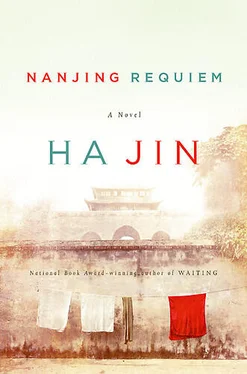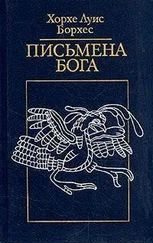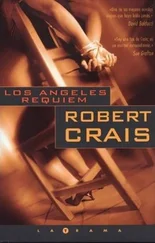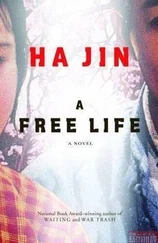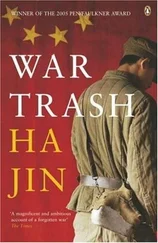Dr. Wu was referring to the attacks by the Chinese army on foreigners in 1927. In March of that year, the troops had gone on a rampage, plundering, burning, and destroying foreign schools and residences. It was believed that the Communists had instigated the violence to frame Chiang Kai-shek and damage his relations with the West. Some soldiers beat up foreigners and assaulted women. A platoon broke into Jinling and carried off several microscopes from a biology laboratory and some staffers’ personal belongings. At Nanjing University six foreign men were shot dead. I remembered how some missionaries had climbed down the city wall and scrambled onto American and British gunboats, which had been laying down a barrage inside the city to keep the Chinese troops from approaching a group of foreigners trapped on a hill. Eventually all the Westerners fled Nanjing, and Minnie and our other foreign faculty members went to Tsingtao and dared not come back to teach. It looked as if that was the end of their mission work here, but some of them returned six months later. Minnie was the very first to come back, eager to complete the construction of a dorm building and the rose garden.
MINNIE HAD GONE to the U.S. embassy to deliver the portmanteau when Searle Bates arrived on a bicycle to inspect our camp in preparation for relief work and to collect the Red Cross flags made by some women from the Jinling neighborhood. He was wearing a gabardine coat and work boots, which made him appear more imposing. He was somewhat slight in build, around five foot nine, and nearsighted. He told me that there were plans for nineteen other refugee camps in the Safety Zone, but there was only one other besides our college that would admit women and children exclusively, the one at Nanjing University’s dormitories. Searle also delivered some letters and a bundle of the North China Daily News , a British newspaper some of our faculty members had subscribed to. Since August, when the Japanese began attacking Shanghai, the paper had always arrived in batches, usually two weeks late.
Searle was a history professor at Nanjing University, most of whose staff had just fled inland with the national government. He had a PhD in Chinese history from Yale and spoke Chinese, Japanese, and Russian. My husband had worked with him before the war, so I had known him for years and liked him. I walked with him through the halls, from which we had cleared all the furniture to make room for refugees. I told him that we expected to receive twenty-seven hundred people maximum, figured on the basis of sixteen square feet per person (each refugee would have a two-by-eight-foot space), but we’d feel more comfortable with two thousand. He nodded, smiling, while his craggy face wrinkled a little, a pair of delicate glasses on his bulky nose. He jotted down the numbers in a notebook, his Parker fountain pen shiny in his sinewy hand. As we were crossing the quadrangle, he tilted his head toward the thirty-foot U.S. flag we had spread in its center to indicate to Japanese bombers that this was American property.
“That’s impressive,” he said.
“Gosh, it took us more than a month to make it,” I told him. “It’s hard to find a capable tailor nowadays. At first the man mistakenly placed the stars in the upper right corner of the flag, and he had a lot of trouble getting them to the left.”
Searle chuckled. “What a pretty haven you have here.” He clucked his tongue. Jinling College was known for its lovely campus, planted with many kinds of trees and flowers. Every fall there’d been a flower show here, but not this year.
Suddenly the air-raid sirens went off, wailing like a mourning crowd. People began running for shelter. “We’d better go underground,” I said, and pointed at the chapel, which had a basement.
Searle shook his head. “I won’t bother with it until I see bombs falling.”
I tugged at his sleeve. “Come. Consider this part of your inspection. You should see our air-raid shelter, shouldn’t you?”
“It’s a false alarm.”
There had been so many wrong warnings lately that people tended to ignore the first signal. But at this point the second siren — shorter but more rapid — began howling, meaning you must take cover. More people were hustling away. As Searle and I were going out the front entrance of our college, explosions thundered in the residential area about a mile away to the east, near West Flower Gate, in the old Manchu city now inhabited by the poor. Pillars of whitish smoke were rising over there while a couple of antiaircraft guns roared, shells bursting in the air like black blossoms.
“Let’s get into that,” I said, leading Searle to a dugout nearby. A hail of flak fragments was rustling through the treetops and pelting the roofs. A handful landed at our feet, raising dust.
Inside the cellar some women held babies in their arms, with toddlers sitting next to them. A mother yelled at her children to stop them from peeking out. Two old men seated on folding stools were battling over a chessboard in a corner lit by a bean oil lamp as if this were their regular haunt and they’d been at the game for hours. A smell like deep-fried fish hung in the air.
When Searle and I sat down, I told him about the women seated around us: “They’re so used to the raids now. In the beginning they wouldn’t dare to let out a peep in here, believing the planes had a device that could detect conversations down below.”
Searle chortled, then said, “It’s despicable to keep bombing the residential areas. I’m going to file a complaint with the Japanese embassy.”
“Those pilots must enjoy dumping bombs on civilians,” I said. “The bastards, they should know this is a war crime.”
“If Japan loses this war, some of them will be brought to trial, I’m sure.”
Uncertain about the outcome of the war, I didn’t say another word. I turned to watch an old woman stitching a cloth sole with an awl and a flaxen thread, a piece of adhesive tape wrapped around the tip of her forefinger.
A minute later Searle remarked, “So only the old, the young, and women are here.”
I didn’t respond, knowing that some foreigners had their doubts about the Chinese, especially the elite and the educated among us. Most of those people were gone. But why would so many of them flee upriver with the national government or to the other interior regions? Why wouldn’t they join the army, if not to fight in the trenches, then at least to help bolster the troops’ morale or to look after the wounded and the sick? This war seemed to be fought by only the poor and the weak. That point neither my husband nor I could dispute. These days I hadn’t been able to drive out of my mind the vision of recruits I often encountered in town. Many of them were merely teenage boys from the countryside, emaciated and illiterate, who could hardly fend for themselves. They were sent to the front as nothing but cannon fodder.
After the all-clear siren, Searle rode away, and I headed for the Administration Building. As I approached it, I saw Minnie talking with Big Liu at the entrance. Liu was six foot two and hulking like a basketball player retired long ago. I went over and greeted them.
Big Liu was asking permission for his family to move to our campus. Minnie had been studying classical Chinese with him since last spring and trusted him, so she granted his request. I was glad, because Big Liu was levelheaded and resourceful, knew English, and had taught Chinese to foreigners for many years. It would be good to have him around.
“Thank you, Miss Vautrin,” Big Liu said in a ringing voice.
“Just call me Minnie,” she reminded him.
“Minnie,” he said with a straight face.
We all laughed. Most people in Nanjing called Minnie “Principal Vautrin,” a form of address that seemed to discomfit her a little, though she wouldn’t object if a stranger called her that.
Читать дальше
